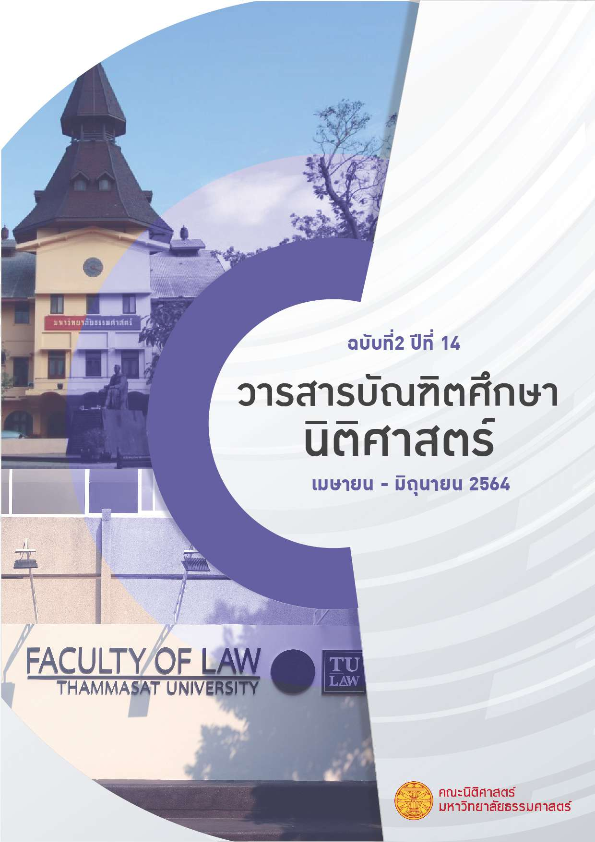PROBLEMS DETERMINATION OF CRIMINAL PUNISHMENT FOR NON-SERIOUS OFFENSE : A STUDY OF ACTS WITH CRIMINAL PUNISHMENT IN THAILAND
Main Article Content
Abstract
This article examines the problem on determination of criminal punishment for non-serious offense in the acts with criminal punishment under Thai laws. The results of this study indicated that several acts with criminal punishment have been enforced in Thailand with both fine and imprisonment sentences. Although in 2017, it said about the principles of determination of criminal punishment in the Section 77 and the Paragraph 3, and in 2019, the legislative issued “Act on Principles to issue the bill and to assess the success of law B.E. 2562”. The content in the article no. 5 of this act allows the legislative use the criminal punishment with the serious offense as much as necessary, but it still can’t solve the problem to determine the criminal punishment with the unserious offense. So, for making the clarity and the suitability to solve the problem of determination of criminal punishment with the unserious offense correctly, the researchers must continue to study about the definition of serious offense and how to do the criminal sanction suitably and necessarily.
This article studied from documents, books, theses, judgements, and laws including any articles relating with the determination the guilt and the criminal punishment for the serious offense under Thai laws and foreign laws. For the foreign laws, we studied and compared with France and Italy because both countries defined the principles to sort the serious offense clearly. Then, we took the study results to compare with the principles of determination of the criminal punishment for the serious offense of Thailand for finding the suggestions and ways to solve the problems for Thailand later.
From the compared results, it found that Thailand didn’t define the principles of the serious offense in any laws clearly, but the definitions were given through the advices of Thai Law Reforms Commission in 2019, and it was only one principle used for considering. France defined the principles of the serious offense in many items. It used the principle to give the marks. If any guilt had the total marks reaching to the criteria, it would be the serious offense, and the criminal punishment would be used to force. For Italy, the principles of damage appearances were defined to be the frame for the consideration of people who enacted. If any guilt made the damages as the definition of defined frame, it would be the serious offense, and the criminal punishment would be used to force. By the way, the mentioned principles would be used to force when the new laws were enacted. For the old laws or the enacted laws and the criminal punishment, they weren’t considered about the serious offense. So, it would be the problem to determinate the criminal punishment with the unserious offense in these acts. So, if Thailand defined the frame or the definition principles of the serious offense more clearly and studied the acts which had the criminal punishment, the criminal punishment would be used in the acts suitably.
Article Details
บทความหรือข้อความคิดเห็นใด ๆ ที่ปรากฏในวารสารบัณฑิตศึกษานิติศาสตร์เป็นความรับผิดชอบของผู้เขียนบทความโดยเฉพาะ คณะนิติศาสตร์ มหาวิทยาลัยธรรมศาสตร์ และกองบรรณาธิการไม่จำเป็นต้องเห็นด้วย
References
เกียรติขจร วัจนะสวัสดิ์, คำอธิบายกฎหมายอาญา ภาค 1 (พิมพ์ครั้งที่ 10, กรุงเทพมหานคร : สำนักพิมพ์ผลสยาม พริ้นติ้ง (ประเทศไทย) 2551).
คณิต ณ นคร, กฎหมายอาญาภาคทั่วไป (พิมพ์ครั้งที่ 5, กรุงเทพมหานคร : สำนักพิมพ์วิญญูชน 2556).
-- กฎหมายอาญาภาคความผิด (พิมพ์ครั้งที่ 10, กรุงเทพมหานคร : สำนักพิมพ์วิญญูชน 2553).
จิตติ ติงศภัทิย์. คำอธิบายประมวลกฎหมายอาญา ภาค 1 (พิมพ์ครั้งที่ 11, นนทบุรี : บริษัท ศูนย์การพิมพ์เพชรรุ่ง จำกัด 2555).
ณรงค์ ใจหาญ และคณะ, การกำหนดชั้นโทษและการนำไปปรับใช้ในประมวลกฎหมายอาญา (สถาบันวิจัยและพัฒนากระบวนการยุติธรรม สำนักงานกิจการยุติธรรม : กรุงเทพมหานคร 2551).
เดือนเด่น นิคมบริรักษ์ และคณะ, ปฏิรูปกฎหมายเพิ่มขีดความสามารถในการแข่งขันของประเทศ (ฉบับที่ 4 เดือน กรกฎาคม - สิงหาคม BOT พระสยาม, MAGAZINE 2562).
ทวีเกียรติ มีนะกนิษฐ, คำอธิบายกฎหมายอาญาภาคทั่วไป (พิมพ์ครั้งที่ 16, กรุงเทพมหานคร : สำนักพิมพ์วิญญูชน2558).
ปกป้อง ศรีสนิท, กฎหมายอาญาชั้นสูง (พิมพ์ครั้งที่ 2, กรุงเทพมหานคร : สำนักพิมพ์วิญญูชน 2561).
หยุด แสงอุทัย, กฎหมายอาญา ภาค 1 (พิมพ์ครั้งที่ 21, กรุงเทพมหานคร : สำนักพิมพ์มหาวิทยาลัยธรรมศาสตร์ 2556).
อภิรัตน์ เพ็ชรศิริ, ทฤษฎีอาญา (พิมพ์ครั้งที่ 4, กรุงเทพมหานครฯ : สำนักพิมพ์วิญญูชน 2562).
วิทยานิพนธ์
เมษยา โรจนอารีย์, ‘การฉ้อฉลทางวิชาการ : ศึกษาการกำหนดความผิดอาญา ฐานรับจ้างทำวิทยานิพนธ์’ (วิทยานิพนธ์ มหาบัณฑิต คณะนิติศาสตร์ มหาวิทยาลัยธรรมศาสตร์ 2559).
สกล นิศารัตน์, ‘กฎหมายอาญาและการลงโทษที่เหมาะสม : แนวความคิดทางด้านปรัชญาและความยุติธรรมทางสังคม’ (วิทยานิพนธ์มหาบัณฑิต คณะนิติศาสตร์ มหาวิทยาลัยธรรมศาสตร์ 2557).
สื่อและหนังสืออิเล็กทรอนิกส์
คำแนะนำของคณะกรรมการพัฒนากฎหมาย, ‘การกำหนดโทษอาญาในกฎหมาย’ (27 พฤศจิกายน 2562)
เอกสารประกอบการสัมมนาและรายงานการวิจัย
ศุภวัฒน์ สิงห์สุวงษ์, ‘บันทึกเรื่อง เกณฑ์พิจารณาในการเลือกกำหนดโทษทางปกครองแทนโทษอาญา’ (การประชุมสัมมนา เรื่อง หลักเกณฑ์การกำหนดโทษทางปกครองในการตรากฎหมาย ส่วนที่ 3, สำนักงาน คณะกรรมการกฤษฎีกา กรุงเทพมหานคร, 2560).
Books and Book Article
Andrew Ashworth and Jeremy Horder, Principles of criminal law (seventh edition, Great Britain : Oxford University Press 2013).
Circolare della Presidenza del Consiglio dei Ministri del 19 dicembre 1983 : Criteri orientativi per la scelta tra sanzioni penali e sanzioni amministrative (Gazzetta Ufficiale del 23 gennaio 1984).
DELMAS-MARTY (M.), Les grands systèmes de politique criminelle (Paris : P.U.F. 1992).
Herbert L. Packer, The Limits of the Criminal Sanction (California : Standford University Press 1968).
Steven Shavell, Criminal law and optimal use of nonmonetary sanctions as a deterrent” In Jules Coleman and Jeffrey Lange, Law and economics (volume 1, Aldershot, Dartmouth 1992).
Wayne R. LaFave and Austin W. Scott, Jr. Criminal Law (2nd ed, Minnesota: West Publishing Company 1986).


